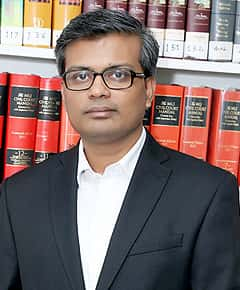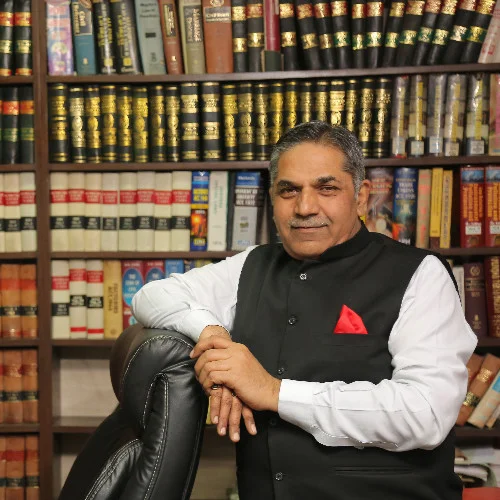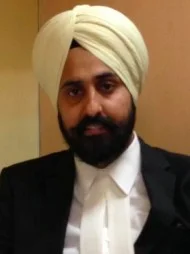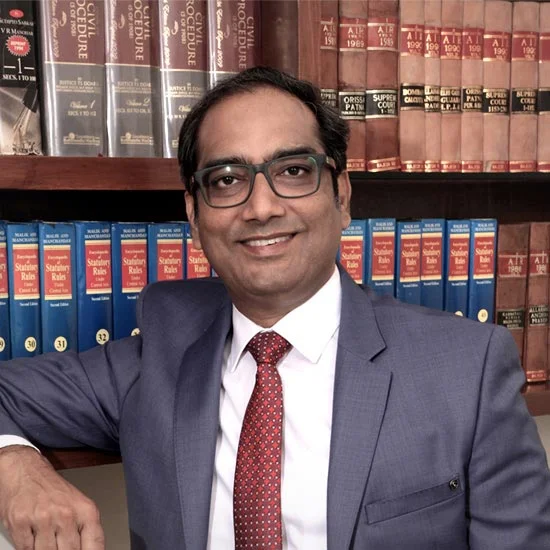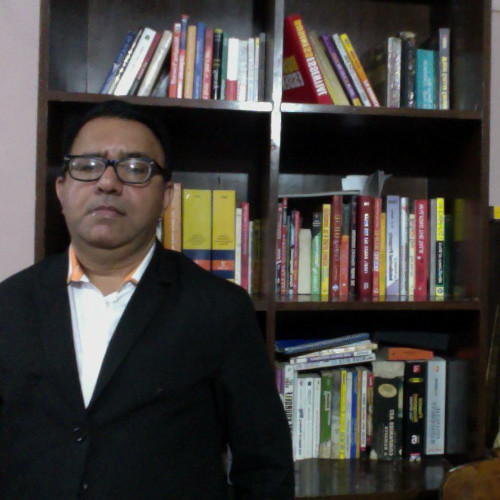Introduction
Mr. Singh is the founder member and the Managing partner of the firm, A.K. SINGH & CO. (Law Offices). He practices law at Supreme Court of India. He is one of the best advocates of Supreme Court at Delhi. Mr. Singh started his career from Delhi High Court where he practiced around 7 years and in the very short span of time he made his niche in the High Court Bar. Thereafter he moved Supreme Court.
Mr. Singh has wide expertise over the matters related to Civil & Commercial Disputes, Family and Matrimonial Disputes, Consumer Disputes and Recovery of Debts for Banking & Financial Institutions and Alternate Dispute Resolution. He is known for his self developed and distinguished negotiation skills, extempore arguments. His experience covers a wide range of litigations, legal consultancy and arbitrations. He possesses superb drafting skill, well acclaimed consummate and effective argumentation skill and unparallel client counseling skill.
He worked extensively in Civil and Corporate Litigation including Civil Suits related to recovery, Injunction, Declaration, Specific Performance, Dispute related to Delhi Rent Control, Probate Petitions, Passing off and infringement of trademarks, consumer disputes, and dispute related to recovery of debts due to banking and financial institutions, writs, revisions, review, appeals etc. Mr. Singh is one of the best Supreme Court lawyer practicing law at supreme court.
The Firm M/s. A.K.SINGH & CO. (Law Offices) also have special team of lawyers in Delhi who operates exclusively in litigation at various stages viz. investigation, trial, revision, appellate etc. under Civil Laws, Matrimonial Laws, Criminal Laws, Corporate Laws, Cyber Laws, Media and Telecommunication Laws, IPR and business laws etc. WE provide litigation services to our clients, under any area of law and before any court of law viz.
• Supreme Court of India, New Delhi.
• High Court of Delhi, Mumbai, Bangalore, Jodhpur & Chandigarh.
• Arbitrators across the Country & Abroad.
OUR SUPREME COURT PRACTICE:
The Firm has very vide and Comprehensive experience of dealing with Supreme Court Cases. The firm has best Supreme Court lawyers in Delhi. Also the firm of advocates used to engage top most Supreme Court lawyers in Delhi time to time, as per instruction of client and as per severity of the matter. Sometimes stakes are very high especially in civil cases-SLP(Civil), then we engage senior advocates, who are best supreme court advocates in Delhi. More than half of our practice is comprises of Supreme Court Cases. We provide following legal services at Supreme Court:
• Special Leave Petition (Civil) under Art. 136 of the Constitution of India.
• Special Leave Petition (Criminal) under Art.136 of the constitution of India.
• Transfer Petition (Civil) under Sec.25 of Code of Civil Procedure
• Transfer Petition (Criminal) under Sec.406 of Code of Criminal Procedure
• Public Interest Litigation under Art.32 of the Constitution of India
• Review Petition under Art.137 of the Constitution of India
• Transfer cases under Art. 139 of the Constitution of India • Plaints under Art. 131 of the Constitution of India read wi
th Order XXIII Rule 1-5 of Supreme Court rules, 1966.
• Petition for Appeal (CIVIL) under Art. 132 & 133 of the constitution of
• India read with Order XV of Supreme court rules, 1966
• Petition for Appeal in Election matters under section 116-A read with section 116-C of the Represantation of Peoples Act, 1951.
• Petition of Appeal Under Section 35L of the Central Excise & Salt Act, 1944 read with Order XX-B rule 1 & 2 of the Supreme Court Rules, 1966.
• Petition of Appeal Under Section 130(E)(b) the Customs Act, 1962 read with Order XX-B rule 1 & 2 of the Supreme Court Rules, 1966.
• Petition of Appeal under section 134 of Constitution of India read with Order XXI Rule 12-29 of the Supreme Court Rules, 1966.
• Petition of Appeal under section 379 of Cr.P.C read with Order XXI, rule 12-29 of Supreme Court Rules, 1966
• Petition of Appeal under Section 19 of the Contempt of Courts Act, 1971 read with Order XXI, rule 12-29 of Supreme Court Rules, 1966.
• CAVEAT under Order XVIII Rules 2 of Supreme Court Rules, 1966.
• Contempt Petition (Civil) under Art. 129 of the Constitution of India read with Order XLVII Supreme Court Rules, 1966
• Contempt Petition (Criminal) under Art. 129 of the Constitution of India read with Order XLVII Supreme Court Rules, 1966
• Creative Petition (Civil) under Art. 137, 142, 145 of the Constitution of India read with Order XVIII, Rule 5 and Order XVII rule 6 of Supreme Court Rules, 1966
We also work with many Senior Advocates and use to engage them for the purpose of representation to our clients before Supreme Court time to time as per the need and instruction of our clients, to serve them better.
He has the wide expertise over the matters related to Civil & Matrimonial Disputes including Divorce cases, Mutual Consent Divorce, Custody of Child, Domestic Violence cases, Procedure before Crime against Women Cell, Maintenance Cases, 498A Cases, bails, Anticipatory Bails in 498A cases, transfer petitions before supreme court etc.
MATRIMONIAL DISPUTES (DIVORCE, CUSTODY, MAINTENACE, DOMESTIC VIOLENCE, BAILS AND CRIMINAL TRIAL IN 498A CASES)
When matrimonial dispute arises between parties to marriage, it brings number of litigations with it. It includes civil as well as criminal litigation and involves civil laws, family laws, matrimonial laws as well as criminal law. We Provide Following Legal services:-
• in filing or defending Criminal complaint Under section 408A read with 406 of Indian Penal Code, 1860 and its proceeding before CAW cell;
• in filing or defending Bail and anticipatory Bail at any level, before any court namely court of session or High Court and supreme court;
• in filing or defending Complaint under Protection of women from Domestic Violence Act 2005 or Complaint under Dowry Prohibition Act;
• in filing or defending, Application under section 125 of Code of Criminal Procedure 1973 seeking maintenance by wife;
• in filing or defending various complaints under the various sections of Indian Penal Code as applicable in the particular case;
• Petition for Divorce under various ground mentioned under section 13 (1) & (2) of Hindu marriage Act viz. cruelty, desertion, impotency, adultery and unsoundness of mind etc. • Petition for custody of children under provisions of Wards and Guardian Act.
• Application u/s 24 of HMA for seeking interim maintenance and expenses by wife;
• Application for restitution of conjugal rights under sec-9 HMA;
• Legal formalities in adoption of children;
• Suit for partition of the joint property owned jointly by husband and wife;
So, we provide comprehensive legal services to our clients so that they can get one window solution of every kind of Disputes and at every level of disputes under matrimonial law, criminal law or disputes related to property. We also provide legal consultancy services, prior to dispute so that the dispute can be avoided, besides providing litigation services to our clients at each and every level of dispute.
Besides the above, we provide legal assistance to our clients in the following matters namely:
• Registration of marriages in Delhi and NCR,
• Conversion from one religion to other
• Nikah under Muslim law
• Police protection to our clients, from courts; • Adoption of children
• Guardianship
• Khula under Muslim laws
• Inheritance & succession
• Drafting and registration of Wills
• Probate and Letter of Registration
• Partition of joint properties
• Divorce by mutual consent
• Restitution of conjugal rights
• Judicial separation
• Interim maintenance
SOME LEGAL PROVISONS RELATED TO THE MATRIMONIAL DISPUTES IN INDIA: Restitution of conjugal rights
Section 9 of Hindu Marriage Act.-
When either the husband or the wife has, without reasonable excuse, withdrawn from the society of the other, the aggrieved party may apply, by petition to the district court, for restitution of conjugal rights and the court, on being satisfied of the truth of the statements made in such petition and that there is no legal ground why the application should not be granted, may decree restitution of conjugal rights accordingly.
Explanation- Where a question arises whether there has been reasonable excuse for withdrawal from the society, the burden of proving reasonable excuse shall be on the person who has withdrawn from the society.
Judicial separation
Section 10 of Hindu Marriage Act.-
(1) Either party to a marriage, whether solemnized before or after the commencement of this Act, may present a petition praying for a decree for judicial separation on any of the grounds specified in sub-section (1) of Section 13, and in the case of a wife also on any of the grounds might have been presented.
(2) Where a decree for judicial separation has been passed, it shall no longer be obligatory for the petitioner to cohabit with the respondent, but the court may, on the application by petition of either party and on being satisfied of the truth of the statement made in such petition, rescind the decree if it considers it just and reasonable to do so.
Nullity of Marriage and Divorce
Sec- 11 of Hindu Marriage Act:
Any marriage solemnized after the commencement of this Act shall be null and void and may, on a petition presented by either party thereto, against the other party be so declared by a decree of nullity if it contravenes any one of the conditions specified in clauses (i), (iv) and (v), Section 5.
Sec:- 12. Voidable Marriages.-
(1) Any marriage solemnized, whether before or after the commencement of this Act, shall be voidable and may be annulled by a decree of nullity on any of the following grounds, namely:- (a) that the marriage has not been consummated owing to the impotency of the respondent; or (b) that the marriage is in contravention of the condition specified in clause (ii) of Section 5; or (c) that the consent of the petitioner, or where the consent of the guardian in marriage of the petitioner was required under Section 5 as it stood immediately before the commencement of the Child Marriage Restraint (Amendment) Act, 1978, the consent of such guardian was obtained by force or by fraud as to the nature of the ceremony or as to any material fact or circumstance concerning the respondent; or
(d) that the respondent was at the time of the marriage pregnant by some person other than the petitioner.
2) Notwithstanding anything contained in sub-section (1), no petition for annulling a marriage-
(a) on the ground specified in clause (c) of sub-section (1) shall be entertained if-
(i) the petition is presented more than one year after the force had ceased to operate or, as the case may be, the fraud had been discovered ; or
(ii) the petitioner has, with his or her full consent, lived with the other party to the marriage as husband or wife after the force had ceased to operate or, as the case may be, the fraud had been discovered;
(b) on the ground specified in clause (d) of sub-section (1) shall be entertained unless the court is satisfied-
(i) that the petitioner was at the time of the marriage ignorant of the facts alleged;
(ii) that proceedings have been instituted in the case of a marriage solemnized before the commencement of this Act within one year of such commencement and in the case of marriages solemnized after such commencement within one year from the date of the marriage; and
(iii) that marital intercourse with the consent of the petitioner has not taken place since the discovery by the petitioner of the existence of the said ground.
Divorce
13. Divorce- (1) Any marriage solemnized, whether before or after the commencement of the Act, may, on a petition presented by either the husband or the wife, be dissolved by a decree of divorce on the ground that the other party-
(i) has, after the solemnization of the marriage had voluntary sexual intercourse with any person other than his or her spouse; or
(ia) has, after the solemnization of the marriage, treated the petitioner with cruelty; or (ib) has deserted the petitioner for a continuous period of not less than two years immediately preceding the presentation of the petition; or (ii) has ceased to be a Hindu by conversion to another religion ; or
(iii) has been incurably of unsound mind, or has suffering continuously or intermittently from mental disorder of such a kind and to such an extent that the petitioner cannot reasonably be expected to live with the respondent.
Explanation- In this clause-
(a) the expression "mental disorder" means mental illness, arrested or incomplete development of mind, psychopathic disorder or any other disorder or disability of mind and include schizophrenia;
(b) the expression "psychopathic disorder" means a persistent disorder or disability of mind (whether or not including sub-normality of intelligence) which results in abnormally aggressive or seriously irresponsible conduct on the part of the other party and whether or not it requires or is susceptible to medical treatment; or
(iv) has been suffering from a virulent and incurable form of leprosy; or
(v) has been suffering from veneral disease in a communicable form; or
(vi) has renounced the world by entering any religious order; or
(vii) has not been heard of as being alive for a period of seven years or more by those persons who would naturally have heard of it, had that party been alive;
Explanation.- In this sub-section, the expression "desertion" means the desertion of the petitioner by the other party to the marriage without reasonable cause and without the consent or against the wish of such party, and includes the willful neglect of the petitioner by the other party to the marriage, and its grammatical variations and cognate expression shall be construed accordingly.
(1-A) Either party to a marriage, whether solemnized before or after the commencement of this Act, may also present a petition for the dissolution of the marriage by a decree of divorce on the ground-
(i) that there has been no resumption of cohabitation as between the parties to the marriage for a period of one year or upwards after the passing of a decree for judicial separation in a proceeding to which they were parties; or
(ii) that there has been no restitution of conjugal rights as between the parties to the marriage for a period of one year or upward after the passing of a decree of restitution of conjugal rights in a proceeding to which they were parties.
(2) A wife may also present a petition for the dissolution of her marriage by a decree of divorce on the ground-
(i) in the case of any marriage solemnized before the commencement of this Act, that the husband had married again before the commencement or that any other wife of the husband married before such commencement was alive at the time of the solemnization of the marriage of the petitioner:
Provided that in either case the other wife is alive at the time of the presentation of the petition;
(ii) that the husband has, since the solemnization of the marriage, been guilty of rape, sodomy or bestiality; or
(iii) that in a suit under Section 18 of the Hindu Adoptions and Maintenance Act, (78 of 1956), or in a proceeding under Section 125 of the Code of Criminal Procedure, 1973, (Act 2 of 1974) or under corresponding Section 488 of the Code of Criminal Procedure, (5 of 1898), a decree or order, as the case may be, has been passed against the husband awarding maintenance to the wife notwithstanding that she was living apart and that since the passing of such decree or order, cohabitation between the parties has not been resumed for one year or upwards;or
(iv) that her marriage (whether consummated or not) was solemnized before she attained the age of fifteen years and she has repudiated the marriage after attaining that age but before attaining the age of eighteen years.
Divorce by mutual consent
13-B. Divorce by mutual consent.-
(1) Subject to the provisions of this Act a petition for dissolution of marriage by a decree of divorce may be presented to the District Court by both the parties to a marriage together, whether such marriage was solemnized before or after the commencement of the Marriage Laws (Amendment) Act, 1976, on the ground that they have been living separately for a period of one year or more, that they have not been able to live together and that they have mutually agreed that the marriage should be dissolved.
(2) On the motion of both the parties made earlier than six months after the date of the presentation of the petition referred to in sub-section (1) and not later than eighteen months after the said date, if the petition is not withdrawn in the mean time, the Court shall, on being satisfied, after hearing the parties and after making such inquiry as it thinks fit, that a marriage has been solemnized and that the averments in the petition are true, pass a decree of divorce declaring the marriage to be dissolved with effect from the date of the decree.
MAINTENANCE CASES:
125. Order for maintenance of wives, children and parents,
(1) If any person having sufficient means neglects or refuses to maintain—
(a) his wife, unable to maintain herself, or
(b) his legitimate or illegitimate minor child, whether married or not, unable to maintain itself, or
(c) his legitimate or illegitimate child (not being a married daughter) who has attained majority, where such child is, by reason of any physical or mental abnormality or injury unable to maintain itself, or
(d) his father or mother, unable to maintain himself or herself, a Magistrate of the first class may, upon proof of such neglect or refusal, order such person to make a monthly allowance for the maintenance of his wife or such child, father or mother, at such monthly rate not exceeding five hundred rupees in the whole, as such magistrate thinks fit, and to pay the same to such person as the Magistrate may from time to time direct:
Provided that the Magistrate may order the father of a minor female child referred to in clause (b) to make such allowance, until she attains her majority, if the Magistrate is satisfied that the husband of such minor female child, if married, is not possessed of sufficient means.
Explanation—For the purposes of this Chapter—
(a) "minor" means a person who, under the provisions of the Indian Majority Act, 1875
(9 of 1875) is deemed not to have attained his majority;
(b) "wife" includes a woman who has been divorced by, or has obtained a divorce from, her husband and has not remarried
(2) Such allowance shall be payable from the date of the order, or, if so ordered, from the date of the application for maintenance
(3) If any person so ordered fails without sufficient cause to comply with the order, any such Magistrate may, for every breach of the order, issue a warrant for levying the amount due in the manner provided for levying fines, and may sentence such person, for the whole, or any port of each month's allowance remaining unpaid after the execution of the warrant, to imprisonment for a term which may extend to one month or until payment if sooner made:
Provided that no warrant shall be issued for the recovery of any amount due under this section unless application be made to the Court to levy such amount within a period of one year from the date on which it became due:
Provided further that if such person offers to maintain his wife on condition of her living with him, and she refuses to live with him, such Magistrate may consider any grounds of refusal stated by her, and may make an order under this section notwithstanding such offer, if he is satisfied that there is just ground for so doing Explanation—If a husband has contracted marriage with another woman or keeps a mistress, it shall be considered to be just ground for his wife's refusal to live with him.
(4) No wife shall be entitled to receive an allowance from her husband under this section if she is living in adultery, or if, without any sufficient reason, she refuses to live with her, husband, or if they are living separately by mutual consent;(5) On proof that any wife in whose favour an order has been made under this section is living in adultery, or that without sufficient reason she refuses to live with her husband, or that they are living separately by mutual consent, the Magistrate shall cancel the order. Maintenance under section 24 of HMA
24. Maintenance pendente lite and expenses of proceedings.- Where in any proceeding under this Act it appears to the court that either the wife or the husband, as the case may be, has no independent income sufficient for her or his support and the necessary expenses of the proceeding, it may, on the application of the wife or the husband, order the respondent to pay to the petitioner the expenses of the proceeding, and monthly during the proceeding such sum as, having regard to the petitioner's own income and the income of the respondent, it may seem to the court to be reasonable.
CRIMINAL COMPLAINT U/S 498A, 406 IPC.
406. Punishment for criminal breach of trust Whoever commits criminal breach of trust shall be punished with imprisonment of either description for a term which may extend to three years, or with fine, or with both.
498A. Husband or relative of husband of a woman subjecting her to cruelty Whoever, being the husband or the relative of the husband of a woman, subjects such woman to cruelty shall be punished with imprisonment for a term which may extend to three years and shall also be liable to fine.
Explanation- For the purpose of this section, "cruelty" means-
(a) any wilful conduct which is of such a nature as is likely to drive the woman to commit suicide or to cause grave injury or danger to life, limb or health (whether mental or physical) of the woman; or
(b) harassment of the woman where such harassment is with a view to coercing her or any person related to her to meet any unlawful demand for any property or valuable security or is on account of failure by her or any person related to her to meet such demand.]
PROTECTION OF WOMEN FROM DOMESTIC VIOLENCE ACT 2005.
Section- 12. Application to Magistrate.-
(1) An aggrieved person or a Protection Officer or any other person on behalf of the aggrieved person may present an application to the Magistrate seeking one or more reliefs under this Act:
Provided that before passing any order on such application, the Magistrate shall take into consideration any domestic incident report received by him from the Protection Officer or the service provider.
(2) The relief sought for under sub-section (1) may include a relief for issuance of an order for payment of compensation or damages without prejudice to the right of such person to institute a suit for compensation or damages for the injuries caused by the acts of domestic violence committed by the respondent:Provided that where a decree for any amount as compensation or damages has been passed by any court in favour of the aggrieved person, the amount, if any, paid or payable in pursuance of the order made by the Magistrate under this Act shall be set off against the amount payable under such decree and the decree shall, notwithstanding anything contained in the Code of Civil Procedure, 1908 (5 of 1908), or any other law for the time being in force, be executable for the balance amount, if any, left after such set off.
(3) Every application under sub-section (1) shall be in such form and contain such particulars as may be prescribed or as nearly as possible thereto.
(4) The Magistrate shall fix the first date of hearing, which shall not ordinarily be beyond three days from the date of receipt of the application by the court.
(5) The Magistrate shall endeavour to dispose of every application made under sub-section (1) within a period of sixty days from the date of its first hearing.18. Protection orders.-The Magistrate may, after giving the aggrieved person and the respondent an opportunity of being heard and on being prima facie satisfied that domestic violence has taken place or is likely to take place, pass a protection order in favour of the aggrieved person and prohibit the respondent from-
(a) committing any act of domestic violence;
(b) aiding or abetting in the commission of acts of domestic violence;
(c) entering the place of employment of the aggrieved person or, if the person aggrieved is a child, its school or any other place frequented by the aggrieved person;
(d) attempting to communicate in any form, whatsoever, with the aggrieved person, including personal, oral or written or electronic or telephonic contact;
(e) alienating any assets, operating bank lockers or bank accounts used or held or enjoyed by both the parties, jointly by the aggrieved person and the respondent or singly by the respondent, including her stridhan or any other property held either jointly by the parties or separately by them without the leave of the Magistrate;
(f) causing violence to the dependants, other relatives or any person who give the aggrieved person assistance from domestic violence;
(g) committing any other act as specified in the protection order.
Key words: Divorce lawyer in Delhi, best Divorce lawyer in Delhi, top Divorce lawyer in Delhi, best Divorce lawyer in Delhi high court, matrimonial advocate in Delhi, Divorce attorney in Delhi, supreme court lawyer in Delhi, bail lawyer, anticipatory bail lawyer, advocate for bail, defence lawyer 498a case, criminal defence lawyer in delhi, criminal lawyer in delhi Divorce lawyer in Delhi
Expertise
Software Engineering, Machine Learning, Image Processing, Computer Vision, Artificial Neural Networks, Data Science, Evolutionary Algorithms.
Qualification
• [B.A (Hon's), PGDBF, LL.B]
• B.A (Hon’s) from B.N. Mandal’s University
• LL.B. from Campus Law Centre, University of Delhi
• PGDBF (Post Graduate Diploma in Banking and finance) from University of Pondicherry.


